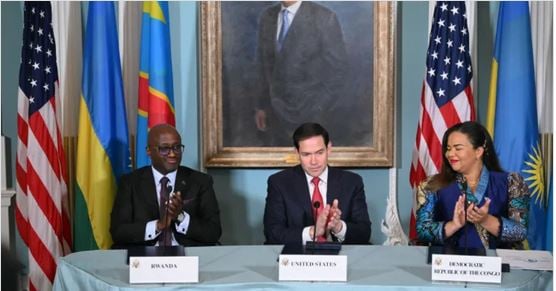
WASHINGTON, June 28, 2025 (BSS/AFP) - Rwanda and the Democratic Republic of
Congo have signed a peace agreement Washington to end fighting that has
killed thousands, with the two countries pledging to pull back support for
guerrillas -- and President Donald Trump boasting of securing mineral wealth.
"Today, the violence and destruction comes to an end, and the entire region
begins a new chapter of hope and opportunity," Trump said as he welcomed the
two nations' foreign ministers to the White House on Friday. "This is a
wonderful day."
The agreement comes after the M23, an ethnic Tutsi rebel force linked to
Rwanda, sprinted across the mineral-rich east of the DRC this year, seizing
vast territory including the key city of Goma.
The deal -- negotiated through Qatar since before Trump took office -- does
not explicitly address the gains of the M23 in the area torn by decades of
on-off war but calls for Rwanda to end "defensive measures" it has taken.
Rwanda has denied directly supporting the M23 but has demanded an end to
another armed group, the Democratic Forces for the Liberation of Rwanda
(FDLR), which was established by ethnic Hutus linked to the massacres of
Tutsis in the 1994 Rwanda genocide.
The agreement calls for the "neutralization" of the FDLR, with Rwandan
Foreign Minister Olivier Nduhungirehe saying the "irreversible and verifiable
end to state support" to the Hutu militants should be the "first order of
business."
The process would be "accompanied by a lifting of Rwanda's defensive
measures," Nduhungirehe said at a signing ceremony at the State Department.
But he added: "We must acknowledge that there is a great deal of uncertainty
in our region, and beyond, because many previous agreements have not been
implemented."
His Congolese counterpart, Therese Kayikwamba Wagner, highlighted the
agreement's call for respecting state sovereignty.
"It offers a rare chance to turn the page, not just with words but with real
change on the ground. Some wounds will heal, but they will never fully
disappear," she said.
The agreement also sets up a joint security coordination body to monitor
progress and calls vaguely for a "regional economic integration framework"
within three months.
- 'A significant step' -
Speaking to reporters earlier Friday, Trump said the United States would be
able to secure "a lot of mineral rights from the Congo."
The DRC has enormous mineral reserves that include lithium and cobalt, vital
in electric vehicles and other advanced technologies, with US rival China now
a key player in securing the resources.
The agreement drew wide but not universal praise.
UN Secretary-General Antonio Guterres called the deal "a significant step
towards de-escalation, peace and stability" in the eastern DRC and the Great
Lakes region.
The landmark agreement was also praised by the chairman of the African Union
Commission.
Mahmoud Ali Youssouf, who witnessed the signing of the deal in Washington,
"welcomed this significant milestone and commended all efforts aimed at
advancing peace, stability, and reconciliation in the region," a statement
said.
But Denis Mukwege, a gynecologist who shared the 2018 Nobel Peace Prize for
his work to end the DRC's epidemic of sexual violence in war, voiced alarm
about the agreement, saying it effectively benefited Rwanda and the United
States.
The deal "would amount to granting a reward for aggression, legitimizing the
plundering of Congolese natural resources, and forcing the victim to alienate
their national heritage by sacrificing justice in order to ensure a
precarious and fragile peace," he said in a statement ahead of the signing.
Physicians for Human Rights, which has worked in the DRC, welcomed the de-
escalation but said the agreement had "major omissions," including
accountability for rights violations.
In Goma, an economic hub near the Rwandan boarder, resident Adeline Furaha
said the accord gave "a glimmer of hope for long-awaited peace."
"I hope my brothers and sisters who fled Goma can now return," Furah said.
"The two countries accusing each other in this war understand that we have
truly suffered."
But for Roland Mumbere, a civil society activist in Goma, the agreement risks
doing little to help the area.
"I'm not satisfied with this agreement because it does not directly ease our
suffering," he said.
"We will still have to wait a long time to see the end of this crisis."